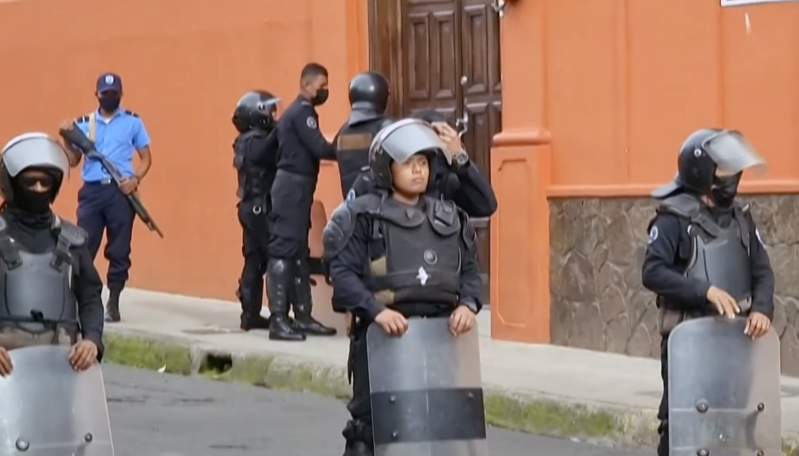
The past year has seen a marked rise in persecution incidents in parts of Latin America, most notably Nicaragua, which some Christian leaders in the region have been following with growing concern. Under the authoritarian leadership of Nicaraguan President Daniel Ortega, an increasing number of Catholic clergy has been subject to various forms of discrimination and persecution, including being exiled from the country. It resembles other countries that have seen authoritarian regimes target people of faith, such as Venezuela and Cuba.
“In 2023 alone, 275 attacks were carried out. We can say this last year was the year with the most attacks against the Church during the recent five-year period,” Martha Patricia Molina, a Nicaraguan lawyer and author of the study Nicaragua: A Persecuted Church? who fled to the United States, told EL PAÍS. Additionally, “176 religious men and women are not exercising their ministry in Nicaragua because they were expelled, prohibited from entering or sent into exile,” she said.
Molina was recognized with an International Religious Freedom Award from the U.S. State Department for her efforts of recording incidents of persecution against the church in Nicaragua.
Roman Catholic churches and leaders are not the only ones suffering under the repressive regime, however. Evangelicals have also felt the increasing pressure and seen ministries and organizations forcefully closed by the government, among various other forms of oppression.
According to a report from the Observatory of Religious Freedom in Latin America (OLIRE) covering the period from January to July 2023 that was shared with Christian Daily International, the severity of the situation has led to public criticism by civil society organizations, both national and international. Inter-American and global human rights bodies as well as representatives from various governments and religious communities have also begun to speak out against repressive measures targeting leaders and members of religious communities.
These individuals have been victims of unjust prison sentences, loss of nationality, arbitrary arrests, unfounded criminal investigations, kidnappings, restrictions on worship both inside and outside religious sites, loss of legal status, mass closures of religious institutions and organizations, property confiscation, financial suffocation, expulsions of religious leaders from the country, and entry restrictions, OLIRE has reported.
Additionally, there has been extensive surveillance of religious leaders, their families, and close associates, as well as police sieges of religious buildings, and monitoring and criminalization of defending one’s faith on social media. Further hostilities are targeted at members of religious groups who, despite not holding official positions within these groups, are labeled as “enemies of the government” and harassed by their communities, paramilitary groups, and local police due to their affiliation with certain faith communities and their proximity to community leaders.
The report also highlights the government’s attempts to create an appearance of closeness and affinity with religious expressions, for example by organizing their religious festivities, and an apparent alignment with a sector of the Church (primarily evangelical).
They aim to undermine the ecclesiastical authority of leaders within certain communities while promoting a mindset of acceptance and tolerance only toward those faith leaders who are not considered opponents. “In other words, they manipulate religious references in their favor, attempting to establish a kind of para-state church,” the report noted.
Looking beyond Nicaragua, the report also highlighted Cuba and Venezuela as indicators how the religious freedom situation can deteriorate under comparable regimes.
Observing what populist governments with communist ideologies, such as Cuba or Venezuela, have done in recent history to Christian institutions, dispossess properties, expelling missionaries, and imprisoning Church representatives, illustrates the notorious oppression by such authoritarian leadership.
"In the case of Venezuela, the nature of the relationship between the government and religious denominations depends largely on their acceptance of the regime's directives," the OLIRE report states.
The same is true in Cuba, where the Observatory notes that "any critic of the 'revolution' is considered an enemy of the government and a traitor. In this context, religious leaders and followers who, motivated by their doctrine of faith, raise their voices against the injustices of the regime, denounce human rights violations, or urge the government to guarantee the right to religious freedom, the right to manifest one's faith, the right to preach and spread the doctrine of faith, the right to obtain legal status, the right to construct and renovate buildings used for worship, among others, become targets of hostilities."
Approached for comment by Christian Daily International regarding successes and setbacks related to religious freedom in the region, Latin Evangelical Alliance (AEL) President Pastor Juan Cruz Cellamare, commented, "We are working with all the national evangelical alliances that make up the AEL to promote agreements with governments, to promote procedures that have been effective in other countries, so that the right to religious freedom is not violated.”
He noted AEL’s partnership with OLIRE, which records media reports of incidents of violence and persecution not only against Christians but also against people of other faith or no faith.
"Cases like Nicaragua, Venezuela, and Cuba are the most difficult to confront. But we are hearing of more and more cases of violence against those of us who believe in Jesus Christ and live according to biblical principles,” Cellamare noted.
Pointing to countries that have drifted to more progressive ideologies and values, he expressed concern about increasing challenges and at times also discrimination against people of faith who seek to hold onto Biblical values.
“Especially in states where the existence of God is denied, they are becoming more progressive and seek their rights at the expense of the rights of others. They claim to respect diversity of opinion, thought, and religious choice, but only for those who think like them. Christians are not included,” he said.





